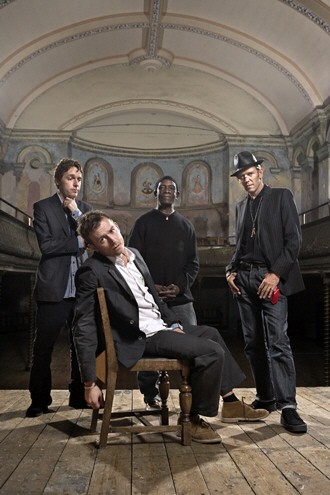|
The Good, The Bad & The Queen mind the age gap. Courtesy photo. |
Another ’60s (among other decades) chanteuse, Juliette Greco, goes a more polished route on Le Temps D’Une Chanson (Sunnyside), in lushly orchestrated sessions with jazz-world guest stars like saxophonist Joe Lovano and trumpeter Wallace Roney. Lovano in particular brings a modern inflection to arrangements that otherwise feel frozen in time, like a trail of cigarette smoke immobilized by a flash bulb or a Jacques Brel lyric spat out in a bit of timeless overacting. Greco has been around the block, but her velvety alto is no worse for wear, making even a kitschy fave like “Volare” sound freshly intimate.
Caetano Veloso, on the other hand, has done well with intimacy and lush arrangements in recent years but strays from that safe zone in Cê (Nonesuch). Here, Brazil’s elder statesman of experimental folk often sounds like a pared-down American indie rocker. With son Moreno helping to produce, he goes lo-fi on “Rocks” and post-punk on “Odeio” — the latter of which features a refrain (“I hate you, I hate you, I hate you/I hate”) that if sung in English might unsettle the NPR crowd who loves his more cuddly records.
Like Veloso, Willie Nelson is an old-timer who rarely stops making records but occasionally spices things up with an oddball collaboration. On the recent Songbird (Lost Highway), he teams with producer Ryan Adams, who also leads backing band the Cardinals. The effect, for those of us who have been disappointed by much of Adams’s solo work, is like a step back into the heyday of Whiskeytown — country-rock that doesn’t try too hard to impress and isn’t interested in getting on the radio. Nelson sounds like he’s singing everything in one take, conveying more feeling on his first pass than most singers would at Carnegie Hall. The disc has plenty of highlights, like the title track and a hard-edged take on Gram Parsons’s “$1,000 Wedding,” but the most impressive may be track six, which proves that it isn’t yet time to call a moratorium on covers of Leonard Cohen’s “Hallelujah.” For fans averse to stylistic wandering, Nelson returns to the worn-smooth floorboards of the honky tonk on the new Last of the Breed, a double disc full of good-time collaborations with Merle Haggard, Ray Price, and others.
Lastly, the news of next month’s The Sandinista Project, a various-artists tribute to the landmark 1981 album by The Clash, reminds me of one of the year’s strangest old-guys/young-guys collaborations, the supergroup The Good, The Bad & The Queen. Teaming Clash bassist Paul Simonon and onetime Fela Kuti drummer Tony Allen on the vet side, Blur’s Damon Albarn and the Verve’s Simon Tong on the younger one, the project goes one step beyond by putting Danger Mouse in the producer’s chair.
The self-titled album (on Parlophone/Virgin) is nothing you’d predict from the list of participants — a moody, gray-day collection of tracks that are less about melody than a glum free-associative account of the sorry state of England. The tunes drip with boozy texture, and if Messrs Mouse and Albarn seem to be the disc’s main authors, their elders also make their presence felt, with bass and percussion effortlessly driving tunes like “Nature Springs” and “Three Changes.” Their dubby rhythm section makes you wonder what a record would sound like if they were at the helm, freed from somebody else’s art-project inspirations — but that’s a comeback for another day.


